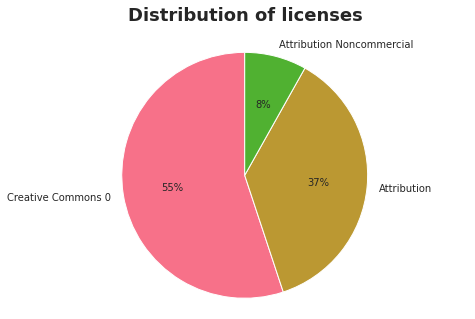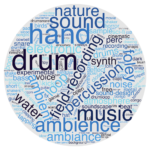Hi everyone,
One year more has passed and here we are with our classic year in numbers post in which we give you some statistics about last year’s Freesound activity. We start by showing some general statistics similar to those shown in previous years’ posts, and also extend a bit on a specific topic which, in this year’s post, is about a very commonly asked question: how much disk space do all the sounds in Freesound take?. But let’s start at the beginning. The number of new sounds uploaded during 2021 was…
56,783 new sounds!
which corresponds to…
1075 hours of audio!
About 10,000 more sounds were uploaded in 2021 than in 2020 and 300 more hours of audio! In last year’s post you’ll see that the increase of sounds was not that high, and the average duration of the sounds had significantly decreased (most probably due to the upload of a large short sounds collection), but this year we’re back to the usual average sound duration (which is 66 seconds, by the way), and therefore the hours of audio is big again. We’ve never had this many sounds uploaded in a single year!
What about the license distribution for these 56k newly uploaded sounds? Here it is:
The distribution has shifted a bit compared to previous years’ distribution and we can see that the use of CC-BY has increased, in detriment of CC-BY-NC and CC0. We will see in the future if this consolidates into a trend, but it is most probably just part of the yearly variability in the usage of licenses.
With the new additions from 2021, Freesound now currently hosts an amazing total of 536,763 sounds, for a total audio length of 345 days and 22 hours. Here is the evolution of the total number of sounds since the beginning of Freesound, and our prediction for the future:
As you’ll remember, in May 2021 we reached 500k sounds, and if our prediction is accurate we should be very close to 600k by the end of 2022.
Here is a tag cloud of the tags of the sounds uploaded during 2021:
The usual big tags as still big (field-recording, music, loop, synth, …), but tags like nature, ambience, hand, and drum seem to be much bigger this year when compared to the past year. The exceptional high usage of the tags hand and drum seems to be because of the contributions by stoltingmediagroup, who has uploaded more than 11k sounds this year (see below), including various packs of hand percussion instruments and drum sounds. The increased usage of the tags nature and ambience is probably due to the contributions by klankbeeld, who has also uploaded many more sounds than usual this year. Here are some examples of these sounds uploaded by stoltingmediagroup and klankbeeld:
Do you want to see a chart of the users who have contributed more sounds in 2021? Here it is:
| Username | # uploaded sounds | Username | uploaded time (hours) | ||
| #1 | stoltingmediagroup | 11200 | #1 | MissloonerVoiceOver255 | 224 |
| #2 | MrFossy | 1839 | #2 | klankbeeld | 126 |
| #3 | TRP | 853 | #3 | Kikomonzon | 37 |
| #4 | Joao_Janz | 810 | #4 | TRP | 31 |
| #5 | deadrobotmusic | 804 | #5 | W1ZY | 20 |
| #6 | klankbeeld | 678 | #6 | tim.kahn | 15 |
| #7 | BaDoink | 664 | #7 | nome_diva | 11 |
| #8 | ZZZTEFANOS | 464 | #8 | plasbodfa | 11 |
| #9 | GAMEDRIX974 | 454 | #9 | felix.blume | 11 |
| #10 | szegvari | 436 | #10 | szegvari | 9 |
| #11 | strangehorizon | 414 | #11 | BaDoink | 8 |
| #12 | josefpres | 397 | #12 | josefpres | 6 |
| #13 | MaciaAC | 393 | #13 | kevp888 | 6 |
| #14 | SuddenDice | 378 | #14 | Garuda1982 | 5 |
| #15 | bogenseeberg | 373 | #15 | inchadney | 5 |
| #16 | Kikomonzon | 368 | #16 | ilmarikoria | 5 |
| #17 | SieuAmThanh | 357 | #17 | hear-no-elvis | 5 |
| #18 | ilmarikoria | 345 | #18 | Roses1401 | 5 |
| #19 | Erokia | 331 | #19 | andreauomogatto | 5 |
| #20 | FunWithSound | 325 | #20 | audiomirage | 4 |
Thanks everyone (not only those appearing in the table) for all the contributions! It is absolutely incredible to see that many new and high-quality sounds being uploaded every year.
And what about downloads? The number of sound downloads (including packs) during 2021 was…
20,948,083 downloads!
As you can see in the plot below, that number is closer to 2019 than to 2020, when there was a significant increase of downloads (related to the increase of visitors due to COVID-19 lockdowns). All in all, users have downloaded more than 191M sounds and packs from Freesound!
For those curious about what is people searching for in Freesound, here is the cloud of query terms that are used by Freesound users when searching for sounds:
As opposed to the tag cloud that we showed before which can be influenced by particular actions like a user uploading a large collection of sounds, the cloud of query terms rarely changes as it is hard to influence the statistics of the millions of queries made every year. The top 10 queries include: wind, rain, music, explosion, piano, footsteps, birds, whoosh, woosh and fire.
Some extra general statistics: In 2021, you sent 43k messages, wrote 1.9k forum posts and made 63k sound comments. All numbers have gone up significantly with the exception of sound comments, which is very similar to last year (but that had a big increase last year). Again, very similar numbers to those of 2018. The number of sounds ratings has also been quite high, 208k sound ratings in 2021. This is a bit less than in 2020, but 2020 had a huge increase compared to 2019 so we’re doing very well. Last year we observed an increased activity in Freesound which we attributed to the increased visitors due to COVID-19 lockdowns. This year we see that some indicators are getting back to normal but we are still reporting very high numbers which makes us thing that many of the users that joined last year must have liked Freesound and stayed.
Finally, to conclude this blog post we would like to put our focus onto the disk usage of Freesound over the years. This is a question that we get often: how much disk space do you need to store all Freesound sounds? Well, here are some answers! Below you’ll see two plots, the first one showing the new disk space that is taken every year (that is to say, the amount of extra Gigabytes that we need every year to store the newly uploaded sounds and related files). The second one shows accumulated statistics for the total disk space taken by Freesound sounds and related files. The related files include the images that we generate for the sounds, the output of our audio analysis and the file previews that are used by the sound players in the website.


As of today, all Freesound sounds and related files take about 7 Terabytes of data. Surprised? Normally people say that they thought it would have been a lot more! But actually this is quite a lot 🙂 Note that many uploaded sounds are very short, and also that some are uploaded in compressed formats. So even if we’re hosting more than half a million sounds, the requirements in terms of disk space are not crazy. This can be seen as all the information that has been uploaded to Freesound. If we look however at the amount of information that we transfer every day mostly in the form of downloads, we see that we transfer around 1 Terabyte per day to users downloading sounds, packs and playing sounds from the browser. Oh wow!
That’s it for 2021 in numbers post! Thanks for reading and we hope you enjoy a 2022 full of sounds 🙂
frederic, on behalf of the Freesound Team






this is my account
i what to do my best
Thank you much, This is best website I ever seen.
I’ve been a member of Freesound for more than 15 years, and I can remember what it was like trying to do educational projects BEFORE Freesound. It is NOT a happy memory! This project has grown into one of the most valuable resources on the web; all those wonderful sounds with clear terms of use! Thanks a zillion times to the Freesound Team and all contributors. There is just no way to thank all of you adequately for something so beyond price!
Freesound is an incredible resource, thank you so much for all your work to both the behind the scenes team and the uploaders.
This is excellent information. Thank you for the transparency and the context.
Pingback: 2022 in numbers | The Freesound Blog